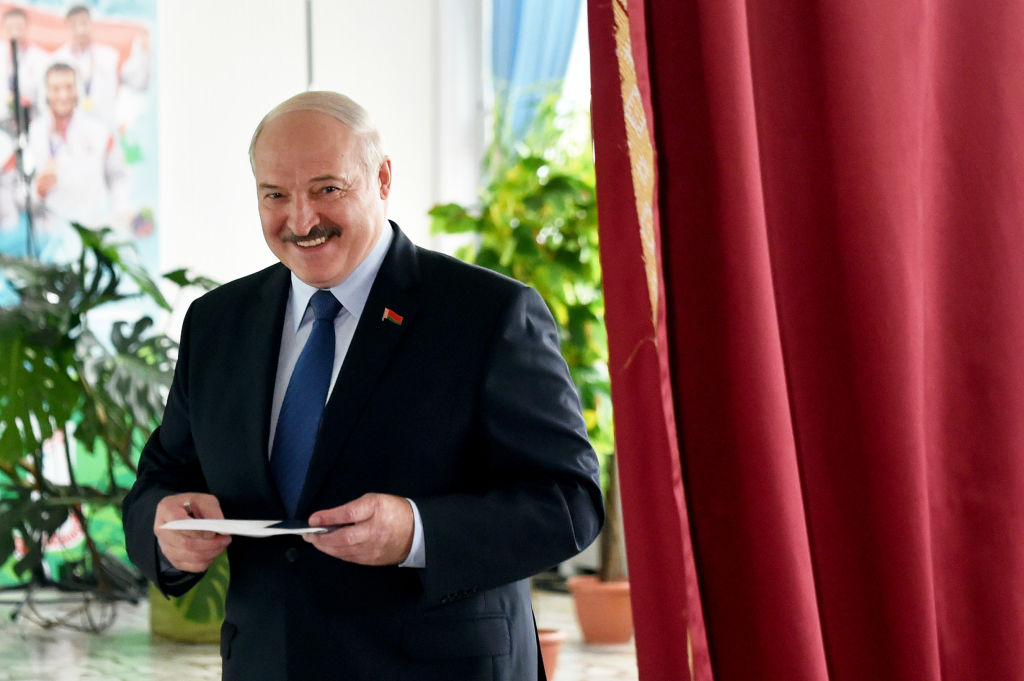The diversion of a Ryanair flight bound for Lithuania from Athens and the arrest of passenger Roman Protasevich — an influential Belarusian blogger critical of the country’s dictatorial regime — is the latest tyrannical action to lead to expressions of grave concern and tempered outrage from the West.
However, the fact that the passenger aircraft was forced to land by a Belarusian fighter jet on the pretense that the plane was carrying explosives is, arguably, a step up on the ladder of severity. Police brutality and the unlawful detention of opposition activists are quick to cause Western condemnation, but those still solely concern domestic matters — the interception of a European plane in transmit between two EU member states is unprecedented. Yet a question infrequently answered is how, in the apparently civilized and enlightened 21st century, leaders are able to get away with such brazen acts against their own populace and with flouting international law.
The reason is, quite simply, due to fear and a sense that the West will never stand up to the world’s dictators. On the home front, Lukashenko has no need for cyber hacks or population monitoring when he has a police force ready and willing to detain or batter political opponents — and when the price of resistance is so brutally high, there is little incentive to join rallies and marches. Leonid Volkov, Alexei Navalny’s chief of staff, told me during an interview for this magazine that over a million Russians would flock to the streets to protest Vladimir Putin’s regime. In the end there were between 7,000 to 9,000 protesters in St Petersburg and 10,000 to 15,000 in Moscow, with over 1,700 people ultimately being arrested at the rallies. In short, few people were willing to risk being arrested.
Anyone disenchanted with Putin or Lukashenko will also hardly be encouraged by countries that chose the Western path. Ukraine and Georgia’s revolutions in 2014 and 2003 saw them both shift towards Brussels and Washington, but this did not bring stability or an end to the violence in either country. Perhaps most infamously, in 2019 protesters in Tbilisi rallied against a visiting Russian Communist MP after he was invited to address the parliament from the speaker’s chair. To disperse the gathering, the police fired rubber bullets into the crowd, blinding a number of protesters and injuring over 200 others. Opposition-minded Russians and Belarusians will hardly be persuaded that a change in foreign policy will end police brutality.
Then there is the fact that Western sanctions never affect those who dominate politics in Minsk and Moscow — Putin’s grip on his country is demonstrably still firm, and while Lukashenko’s hold in Belarus was rocked after the 2020 elections, he recovered after unleashing the police force on the populace. Any key Belarusian opposition figure not in hiding is currently imprisoned, with many alleged to have been tortured.
The loyalty of the police is also strengthened by the experience of other states. Police in Belarus and Russia will look to the revolutions in Kyiv and Tbilisi and see what became of those who had sided with the authorities. Former president Mikheil Saakashvili, who ascended to office in Georgia’s 2003 bloodless rose revolution, became notorious for purging the country’s law enforcement agencies of those with ties to the prior administration. This may have ended the systemic corruption that had plagued the country since the collapse of the Soviet Union, but his draconian methods were subject to criticism in the years that followed.
Fear, then, is a driver for both sides — protesters are reluctant to risk imprisonment, beating, torture, or death, while those holding up despotic regimes fear landing in the losing camp.
The West, too, hardly demonstrates its strength when it calls for minimal sanctions that never seem to affect those in charge. Lukashenko undoubtedly felt confident in his latest vulgar display of power since he knows that Vladimir Putin and Russia are both behind him; perhaps he also takes comfort from the little done to counter human rights abuses in Turkey and China.
The desire to avoid escalation, by way of appeasement or limp expressions of outrage, cannot avoid or prevent major international incidents or conflict. The West must find its fire: the interception of a European airliner en route between two European states cannot be dismissed as a developing country’s internal spat in which it is not obligated to intervene. As things stand, Brussels and Washington have mastered Teddy Roosevelt’s maxim of speaking softly — but they have forgotten the part about carrying a big stick.
This article was originally published on The Spectator’s UK website.

























